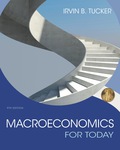
EBK MACROECONOMICS FOR TODAY
9th Edition
ISBN: 8220101425966
Author: Tucker
Publisher: CENGAGE L
expand_more
expand_more
format_list_bulleted
Question
Chapter 19, Problem 11SQ
To determine
The determinant of what to produce under market economy.
Expert Solution & Answer
Want to see the full answer?
Check out a sample textbook solution
Students have asked these similar questions
how opportunity coast relate to Economics ?
which article about commond Economic and hor it relate to Principle of Economics?
which one article about utility in an Economics and how this article relate to principle of Economics?
Chapter 19 Solutions
EBK MACROECONOMICS FOR TODAY
Ch. 19.3 - Prob. 1GECh. 19.3 - Prob. 2GECh. 19 - Prob. 1SQPCh. 19 - Prob. 2SQPCh. 19 - Prob. 3SQPCh. 19 - Prob. 4SQPCh. 19 - Prob. 5SQPCh. 19 - Prob. 6SQPCh. 19 - Prob. 7SQPCh. 19 - Prob. 8SQP
Ch. 19 - Prob. 1SQCh. 19 - Prob. 2SQCh. 19 - Prob. 3SQCh. 19 - Prob. 4SQCh. 19 - Prob. 5SQCh. 19 - Prob. 6SQCh. 19 - Prob. 7SQCh. 19 - Prob. 8SQCh. 19 - Prob. 9SQCh. 19 - Prob. 10SQCh. 19 - Prob. 11SQCh. 19 - Prob. 12SQCh. 19 - Prob. 13SQCh. 19 - Prob. 14SQCh. 19 - Prob. 15SQCh. 19 - Prob. 16SQCh. 19 - Prob. 17SQCh. 19 - Prob. 18SQCh. 19 - Prob. 19SQCh. 19 - Prob. 20SQ
Knowledge Booster
Similar questions
- How Command Economics Relate to Principle Of Economics?arrow_forwardhow commond economies relate to principle Of Economics ?arrow_forwardCritically analyse the five (5) characteristics of Ubuntu and provide examples of how they apply to the National Health Insurance (NHI) in South Africa.arrow_forward
- Critically analyse the five (5) characteristics of Ubuntu and provide examples of how they apply to the National Health Insurance (NHI) in South Africa.arrow_forwardOutline the nine (9) consumer rights as specified in the Consumer Rights Act in South Africa.arrow_forwardIn what ways could you show the attractiveness of Philippines in the form of videos/campaigns to foreign investors? Cite 10 examples.arrow_forward
- Explain the following terms and provide an example for each term: • Corruption • Fraud • Briberyarrow_forwardIn what ways could you show the attractiveness of a country in the form of videos/campaigns?arrow_forwardWith the VBS scenario in mind, debate with your own words the view that stakeholders are the primary reason why business ethics must be implemented.arrow_forward
- The unethical decisions taken by the VBS management affected the lives of many of their clients who trusted their business and services You are appointed as an ethics officer at Tyme Bank. Advise the management regarding the role of legislation in South Africa in providing the legal framework for business operations.arrow_forwardTyme Bank is a developing bank in South Africa and could potentially encounter challenges similar to those faced by VBS in the future. Explain five (5) benefits of applying business ethics at Tyme Bank to prevent similar ethical scandals.arrow_forward1.3. Explain the five (5) ethical challenges that can be associated with the implementation of the National Health Insurance (NHI) in South Africa.arrow_forward
arrow_back_ios
SEE MORE QUESTIONS
arrow_forward_ios
Recommended textbooks for you




 Economics Today and Tomorrow, Student EditionEconomicsISBN:9780078747663Author:McGraw-HillPublisher:Glencoe/McGraw-Hill School Pub Co
Economics Today and Tomorrow, Student EditionEconomicsISBN:9780078747663Author:McGraw-HillPublisher:Glencoe/McGraw-Hill School Pub Co Exploring EconomicsEconomicsISBN:9781544336329Author:Robert L. SextonPublisher:SAGE Publications, Inc
Exploring EconomicsEconomicsISBN:9781544336329Author:Robert L. SextonPublisher:SAGE Publications, Inc





Economics Today and Tomorrow, Student Edition
Economics
ISBN:9780078747663
Author:McGraw-Hill
Publisher:Glencoe/McGraw-Hill School Pub Co

Exploring Economics
Economics
ISBN:9781544336329
Author:Robert L. Sexton
Publisher:SAGE Publications, Inc